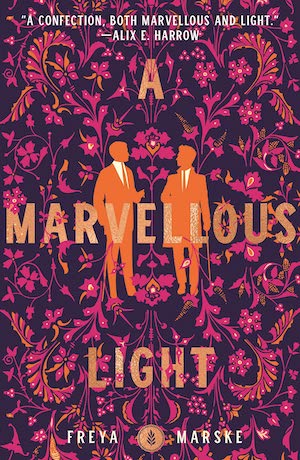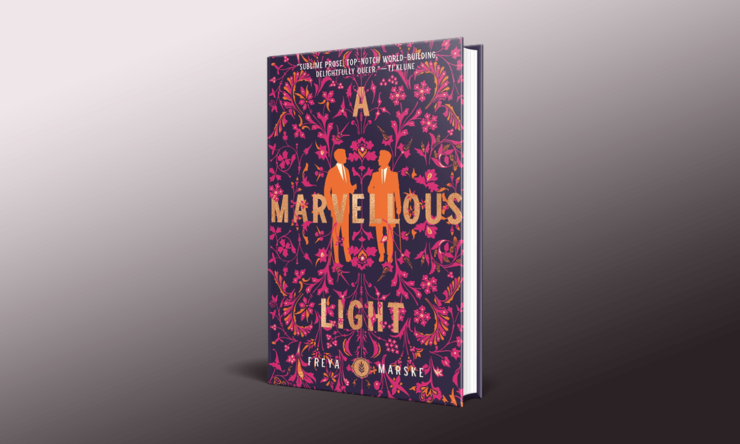Pity Robin Blythe, one of two protagonists in Freya Marske’s debut fantasy novel A Marvellous Light. Not only is he stuck with a new job he doesn’t want; not only does said job land him squarely in the teeth of the Edwardian bureaucracy; but his very first day at work features the unsettling revelation—delivered by the colorless and bookish Edwin Courcey, liaison to the Magical Assembly—that magic is real, followed by a spot of abduction in the London streets. Robin’s assailants want him to find a contract hidden from them by Robin’s missing (let’s be real, dead) predecessor, and they place a curse on him to motivate him to find the contract and bring it to them.
Edwin, for his part, has neither the time nor the inclination to go gallivanting around London in the company of this (or any) hot and sunshiney jock counterpart. As the least magical member of a highly magical family, he’s accustomed to being the butt of cruel jokes from hot athletic people and would prefer to stay home and study magical theory. Regrettably, he has good morals and can’t bring himself to leave Robin in the grips of an ever-worsening torture curse. It’s not because Robin’s hot; it’s because of morals.
To lift Robin’s curse, Edwin very reluctantly takes him to his own family home, where they’re surrounded by Edwin’s horrible siblings and their horrible friends, who view Edwin as a disappointment and unmagical Robin as a plaything. Then Robin uncovers evidence that the mysterious “contract” his attackers were after may be the stuff of legend: a centuries-old promise made by the fae as they departed England to leave some magic behind for the use of humans. In the wrong hands, this contract could allow unscrupulous magicians to siphon magic away from others and cement their control over England and the power its people hold.
Buy the Book


A Marvellous Light
A Marvellous Light continues the burgeoning (and long-overdue) trend of SFF letting romance novels into the clubhouse. By the rules of the romance genre, we need not worry about whether Edwin and Robin will end the book partnered, alive, and uncursed. The fun, as always, is watching it unfold. Marske knows what her readers want and gives it to them in spades: I performed a little wriggle of delight every time Edwin contemplated about laddish athletes as a category and Robin Blythe as a notably unattractive sample of that category. It was many times. He contemplated this a lot. There are displays of competence to heighten the attraction, complicated family relationships to elicit empathy, and a quite delightful accidental discovery of a mutual interest in porny gay pamphlets.
There’s an old Monty Python sketch called “Sam Peckinpah’s Salad Days,” in which a posh, pin-striped day of tennis and ostentatious wealth devolves into a gore-fest of detached limbs. A Marvellous Light offers up a similar blend of the very wholesome (swans! boning in parlors! mutual admiration for library classification systems!) and the very gruesome (malicious holly hedges that bulge and bubble before they attack, two verbs that made yr correspondent say “eurgh” out loud on the bus). Robin spends most of the book fending off a torture curse while he and Edwin pursue a group of likely-magical likely-murderers, but the emotional arc of the book is more along the lines of “people should really be nicer to you; let’s see what we can do about making that happen.” The more Robin sees Edwin’s family dismiss and belittle him, the gentler he wants to be with Edwin himself. When he and Edwin are trapped in, again I say, bubbling holly hedges that are trying to kill them, it’s Robin’s faith in Edwin’s intelligence that sees them through. A heartwarming combination for these difficult times!
A Marvellous Light has drawn comparisons to Jonathan Strange & Mr Norrell, but a more natural comp for its particular brand of magic is KJ Charles’s Spectred Isle. Marske subscribes to what I call the vibes school of worldbuilding, which here includes blood ties to family land, hedge mazes that are trying to kill you, tattoo curses, and—in a nod to the shambles of Terry Pratchett—the use of cat’s cradles for elementary-level magicians to scaffold spells. It’s all tremendously fun and atmospheric, though you might not want to spend too much time trying to work out how all the pieces fit together.
The novel gestures to the fact that women in the world of English magic exist as babymakers and helpmeets to their male counterparts, and a central piece of the mystery lies with a brilliant female magician. Where women enter the narrative, like Robin’s aggressively competent secretary or Edwin’s ailing mother, Marske has clearly taken pains with their vividness and specificity. Still, by virtue of being a romance between two male principals, the book presents a world prejudiced in favor of men that is filtered through the perspectives of only men. Though Edwin faces ridicule and even abuse as a less-powerful magician, it’s clear that doors are open to him that would be unavailable to magicians of other genders. Knowing that A Marvellous Light is the first in a planned series, I dearly hope to witness some high-quality burning down of the patriarchy by women in future books.
With nearly two years of pandemic under our belts now, there’s something wonderfully soothing about the ethic of care that runs through A Marvellous Light. The magic of this world is ancient, mystical, and expansive, but it’s wielded and controlled by Daisy and Tom Buchanan types, who view magic as a resource to be hoarded, then expended in petty, stupid amusements. What sets Robin and Edwin (and their allies) apart are the pains they take with their work, with the people around them, and most especially with each other. The adage “anything worth doing is worth doing right” is not, on the face of it, a particularly tender sentiment. But in Marske’s hands, the willingness to take trouble over a problem feels infinitely warm, an antidote to the chilly carelessness of all too many people in Robin’s and Edwin’s lives.
Early in the book, when Edwin must reveal the existence of magic to Robin, he painstakingly conjures up a snowflake, a spell he personally knows to be unimpressive to other magicians. In that moment, it’s not the fact of magic that allures Robin. Rather, it’s the precision and focus that Edwin puts into making something lovely. A Marvellous Light is an intricate confection of a novel that weaves together magical conspiracy, William Morris wallpaper, and true love.
A Marvellous Light is available from Tordotcom Publishing.
Jenny Hamilton has a library, but has not yet attained the pinnacle of human happiness that is the sliding bookshelf ladder. She can be found on Twitter lamenting this and other injustices, or noisily recommending books at her blog.










